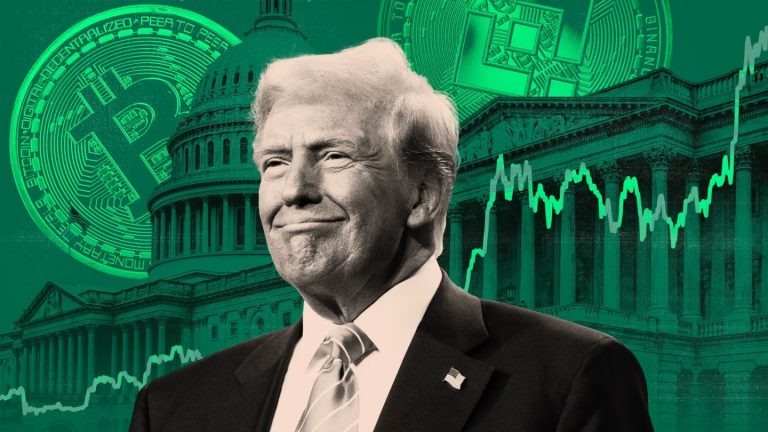
President Donald Trump hosted a private dinner at his Trump National Golf Club in Virginia for the top 220 investors in his $TRUMP memecoin, a cryptocurrency launched just before his second inauguration in January 2025. The event, billed as an exclusive opportunity to dine with the president, drew significant controversy due to its potential for ethical conflicts, as the Trump family directly profits from the memecoin’s transactions.
Over 100 protesters gathered outside the venue, organized by groups like Public Citizen and Our Revolution, holding signs with messages like “Stop Crypto Corruption” and “America is Not for Sale,” accusing Trump of leveraging his presidency for personal gain. Hours before the dinner, Representative Maxine Waters, a California Democrat and ranking member of the House Financial Services Committee, introduced the “Stop Trading, Retention, and Unfair Market Payoffs in Crypto Act of 2025” (HR 3573), acronymized as the “Stop TRUMP in Crypto Act.”
The bill aims to prohibit the president, vice president, members of Congress, and their immediate families from issuing, holding, or profiting from cryptocurrencies while in office, citing concerns over “crypto crime” and potential foreign influence through anonymous transactions. The dinner, attended by notable crypto figures like Tron founder Justin Sun, sparked further criticism from Democratic lawmakers like Senators Chris Murphy and Elizabeth Warren, who called it a “pay-to-play” scheme and an “orgy of corruption.”
Register for Tekedia Mini-MBA edition 19 (Feb 9 – May 2, 2026).
Register for Tekedia AI in Business Masterclass.
Join Tekedia Capital Syndicate and co-invest in great global startups.
Register for Tekedia AI Lab.
Critics highlighted the anonymity of many attendees, with some using pseudonyms like “Ogle,” and raised concerns about foreign nationals potentially buying access to the president, which could violate the U.S. Constitution’s foreign emoluments clause. The $TRUMP memecoin, which surged in value after the dinner announcement, has generated significant revenue for the Trump family, with estimates of over $324 million in trading fees since its launch.
However, the token’s volatility has led to substantial losses for many retail investors, with blockchain data indicating over 590,000 wallets losing nearly $4 billion. Despite White House claims that Trump’s assets are in a blind trust managed by his sons and that he acts in the public’s interest, the event has intensified scrutiny over his crypto ventures, including ties to World Liberty Financial and a stablecoin called USD1.
The dinner raises questions about potential violations of the U.S. Constitution’s foreign emoluments clause, which prohibits federal officeholders from accepting money from foreign governments without congressional consent. If foreign nationals attended the event or invested heavily in $TRUMP, it could trigger legal challenges, though proving direct influence would be complex due to the anonymity of crypto transactions.
The “Stop TRUMP in Crypto Act” (HR 3573), introduced by Rep. Maxine Waters, seeks to close loopholes allowing public officials to profit from cryptocurrencies. If passed, it would set a precedent for regulating digital assets held by elected officials, potentially facing resistance from pro-crypto lawmakers but gaining traction among those concerned about corruption. The bill’s specificity to sitting officials could limit its scope but may inspire broader crypto regulation.
The SEC and CFTC may investigate $TRUMP for market manipulation or unregistered securities offerings, given its volatility and the Trump family’s direct financial stake. The anonymous nature of some investors could also prompt probes into compliance with anti-money laundering (AML) and know-your-customer (KYC) regulations. The event deepens partisan divides, with Democrats framing it as evidence of corruption and Republicans likely defending it as a legitimate business venture.
This could fuel campaign narratives in future elections, with Democrats leveraging the issue to rally anti-Trump voters and Republicans portraying the bill as an overreach targeting the president. The perception of “pay-to-play” access erodes trust in government, especially among voters already skeptical of institutional integrity. Protests outside the dinner signal growing public discontent, which could pressure lawmakers to act but also galvanize Trump’s base, who may see the controversy as an attack on his entrepreneurial freedom.
The bill’s introduction may spur hearings or investigations by the House Financial Services Committee, potentially exposing more details about Trump’s crypto ventures. However, passage in a polarized Congress is uncertain, especially if Republicans hold key majorities. The $TRUMP memecoin’s volatility—surging post-dinner but causing $4 billion in losses for retail investors—highlights risks in celebrity-driven cryptocurrencies. This could dampen enthusiasm for memecoins, affect market sentiment, or prompt stricter oversight of similar projects.
The reported $324 million in trading fees underscores the significant personal financial stakes for the Trump family, potentially incentivizing further promotion of $TRUMP or related ventures like World Liberty Financial. However, legal or regulatory crackdowns could jeopardize these revenue streams. The losses incurred by over 590,000 wallets may deter retail investors from crypto markets, particularly in politically tied projects, while reinforcing skepticism about the stability of non-regulated digital assets.
Trump’s direct profit from $TRUMP, despite claims of a blind trust, raises ethical questions about a sitting president monetizing their influence. The dinner’s exclusivity for top investors suggests access to the president may be tied to financial contributions, undermining democratic principles. The anonymity of attendees, including figures like “Ogle,” fuels concerns about undisclosed foreign or corporate influence, challenging the integrity of public office.
If unaddressed, this event could normalize elected officials leveraging their positions for crypto profits, setting a dangerous precedent for governance and accountability. The controversy aligns with ongoing debates about cryptocurrency’s role in politics and governance, especially as digital assets gain mainstream traction. It may accelerate calls for comprehensive crypto regulation, balancing innovation with accountability.
Internationally, the event could draw scrutiny from allies and adversaries, with implications for U.S. credibility in global financial markets if foreign influence is confirmed. The dinner and the proposed bill highlight tensions between personal profit, public office, and emerging financial technologies, with potential ripple effects on policy, markets, and public trust. The outcome of HR 3573 and any related investigations will shape the intersection of cryptocurrency and political power in the U.S.



